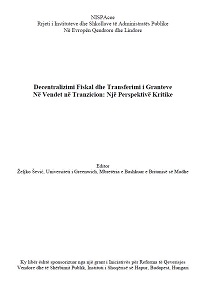Decentralizimi Fiskal në Republikën Çeke: Çështjet Aktuale dhe Problemet
Fiscal Decentralization in the Czech Republic: Current Issues and Problems
Author(s): Phillip J. Bryson, Gary C. Cornia
Subject(s): Economy, Developing nations, Public Finances
Published by: ASET Albanian Socio - Economic Think - Tank
Keywords: Fiscal Decentralisation in the Czech Republic; Property Tax; Grants
Summary/Abstract: The Czech Republic's economic and fiscal transition to a market-oriented and decentralized economy, as well as progress in achieving local self-government, have been notable. These achievements have placed the Czech Republic on the list of countries aspiring to be part of the European Union. This is the second time that the Czechs have come close to membership as a modern democracy. At the end of World War I, Bohemia and Moravia were no longer part of the Austro-Hungarian Empire. By then, they had secured limited self-government and had embarked on a path toward industrial development. When the Empire dissolved in 1918, Slovakia joined Bohemia and Moravia to form the Federal State of Czechoslovakia. This first and temporary experiment in federalism gave the new federation an opportunity to experiment with democracy and begin a tradition of local self-government.
Book: Decentralizimi Fiskal dhe Transferimi i Granteve në Vendet në Tranzicion: Një Perspektivë Kritike
- Page Range: 29-48
- Page Count: 20
- Publication Year: 2009
- Language: Albanian
- Content File-PDF

